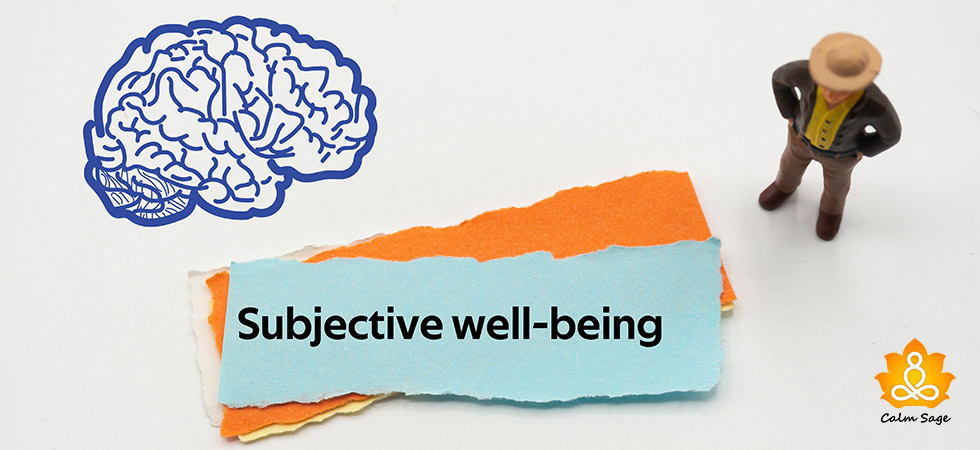What Is Subjective Well-Being?

The concept of Subjective well-being was first used by Ed Diener in 1984 when he developed the first model of Subjective well-being. Diener’s subjective well-being model talks about people’s experiences of life including emotional reactions and cognitive judgements.
According to Diener’s Subjective well-being theory, there are three main components of subjective well-being;
- Frequent Positive Affect: frequently experiencing positive emotions on a daily basis
- Frequent Negative Affect: frequently experiencing negative emotions
- Cognitive evaluations: involves what people think of their life, happiness and life satisfaction.
Deiner claims that these compliments are responsible for one’s comprehension of what kind of life he/she/they are leading. Subjective well-being is basically a measure of how well you are doing in life, emotionally, mentally & physically. It is a measure of happiness, well-being and life satisfaction.
Let’s learn more about Subjective well-being…
What Is Subjective Well-Being?

Subjective well-being was introduced in 1984. It is considered to be a measure of happiness, life satisfaction and general well-being. Subjective well-being can be referred to as a self-report which evaluates the experiences one has had in the life they have led so far.
Subjective well-being definition- According to the National Center for Biotechnology Information (NCBI),
“Subjective well-being (SWB) refers to how people experience and evaluate their lives and specific domains and activities in their lives.”
In fact some researchers also call it “Self-Report Well-being” because it involves evaluating different aspects of your own life.
Signs Of Subjective Well-being
To understand Subjective Well-being better, you need to know about the signs of subjective well-being. Well, Diener claimed that most people usually repost positive emotions and feelings. He also found that people scoring the highest in subjective well-being scoreless in loneliness and high in general well-being.
Let’s look at some other signs of subjective well-being;
- Have acceptance for others.
- Socially involved,
- Increased sense of belongingness,
- Independent,
- High life satisfaction,
- Have a good social support system,
- Experience a good amount of positive emotions,
- Engage in exercises for spiritual well-being,
- Self-acceptance, etc.
There are many other factors that indicate good Subjective Well-being but these are some of the common ones. Basically if you think you are leading a good quality life, are satisfied with all that you have and are willing to invest your time on self-improvement and similar productive things and you probably have good Subjective Well-being.
Also read: Mental Health And Wellbeing 2020 In Review | Everything You Need To Know
Types Of Subjective Well-Being
Initially Subjective well-being was considered to be only about your emotional and cognitive well-being. But later when other researchers started studying Subjective Well-being they found that there are other factors that influence Subjective Well-being.
Because of these findings it was suggested to divide Subjective Well-being in two types;
- Experience Well-being: also known as hedonic well-being, encapsulates your feeling of happiness and joy that you experience in your day-to-day life. It is about both emotional and cognitive aspects of general well-being.
- Eudaimonic Well-being:this type of Subjective Well-being is deeper and evaluates life according to the meaning of life, achieving life goals, leading an ideal life, etc.
Also read: What Are The Elements Of Mental health? How Do They Boost Our Well-being
How Does Subjective Well-being Affect Our Mental Health?

Subjective Well-being and mental health both are interdependent concepts. If you have good Subjective Well-being, you’re most likely to have good mental health and vice versa. We all know that mental illness can be defined as the presence of some symptoms of a mental health condition.
But does the absence of any symptoms of a mental health condition mean you are mentally fit? Well, not everything is black or white. Even in the absence of any symptoms, your mental health can still be affected.
This is where Subjective Well-being comes in the picture. Subjective well-being determines how you think your life is. Whether you are happy, sad, satisfied, etc. in life. You will not be at peace if your Subjective Well-being is negatively inclined.
So, even if you do not have a mental health condition, you continuously need to work hard to improve your subjective well-being.
That’s All folks!
I hope you found this blog interesting and thought-provoking. Do share this blog with your friends and family so that we all can understand what subjective well-being is and what is the relation between Subjective Well-being and mental health.
Thanks for reading.
Take care and stay safe.




















